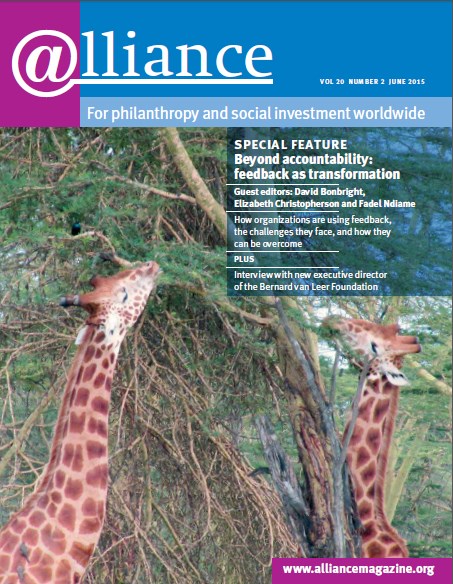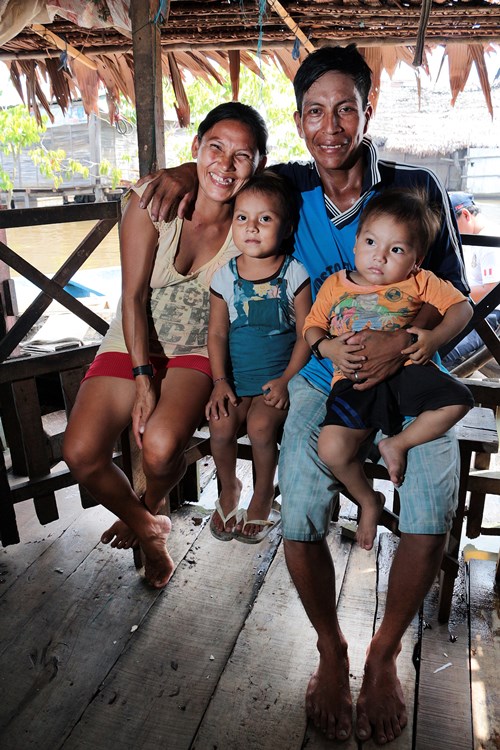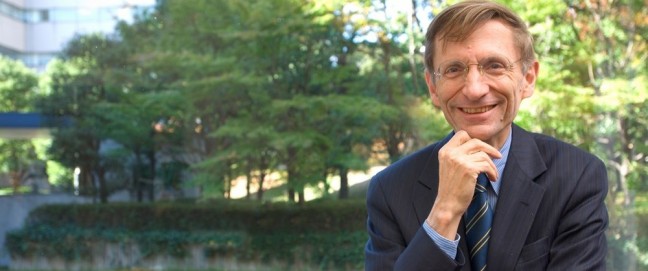‘I would like to have a few examples where we have really seen an impact at scale.’
Michael Feigelson is the new executive director of the Bernard van Leer Foundation (BvLF), but he’s not new to the foundation, having been with BvLF for over seven years in various capacities. What’s special about BvLF, Caroline Hartnell asked him, and how does he see its work developing in the coming years?
What do you see as most distinctive about the way BvLF works?
First, we’ve focused on the same issue – early childhood development – for 50 of the last 65 years. Second, we’ve always worked in different kinds of countries, geographically, culturally, socioeconomically, which reflects the belief that young children’s development is a global challenge that needs people from all parts of the world to work together and learn from one another. Finally, and particularly under Lisa Jordan’s leadership, we’ve done more work on advocacy in recent years, which I think has added a lot of value to a field where there is a lot of knowledge, but where that knowledge does not always translate into social change.
‘We will try to develop more partnerships with institutions that are capable of reaching hundreds of thousands or millions of children and where the nature of the relationship is more about sharing expertise than giving grants.’
Are there areas of work you’d like to develop further over the next few years?
We’re going to focus more on the situation of families with young children. The hypothesis is that you get the biggest development outcomes for children if you make things better at home. We’ll also give special emphasis to young children and families living in cities given the demographic shift towards urban environments around the world. Finally, we will try to develop more partnerships with institutions that are capable of reaching hundreds of thousands or millions of children and where the nature of the relationship is more about sharing expertise than giving grants.
If you’re putting more emphasis on families, does that mean you’ll be looking more holistically at the child’s environment than, say, if you were focused on education?
If you want to have the biggest impact, particularly in the first thousand days of the child’s life, you need to improve family conditions, and that’s not to do with one particular sector. So yes, it will be more holistic than just looking at it through an education frame. Exactly what sectors we work through will change depending on what country we’re in and where there is the greatest potential for impact.
Do you see all of BvLF’s work as aiming to achieve social change? And does this mean a long-term approach?
If the question is, are we looking to make a large-scale impact on the way society supports its young children, then the answer is definitely yes. Everything we do is intended to be supportive of much larger-scale changes than we as a foundation could achieve on our own.
This often involves a long timeframe, but not always. It really depends on what the starting point is in the particular place you’re working. Sometimes, things have happened very quickly; sometimes it takes ten years to get any real traction. But especially when working on matters of public policy, which we frequently are, if a change is going to stick, it probably needs to endure several political administrations, which does imply a longer-term horizon.
Does all your work involve grantmaking?
Grantmaking is important, but not in isolation. It is one of the tools for achieving our goals, but used in conjunction with other things like knowledge development, partnership building, convening and advocacy.
During your time as a McKinsey consultant, you developed a strong belief in the value of engaging the private sector as a champion for change. How is the private sector involved in BvLF’s work now and how might this develop?
I can give two examples of how the private sector is involved now. One is the Private Sector Foundation of Uganda, an association of Ugandan businesses and business associations, with which we have worked over the last few years to help give public prominence to early childhood development in Uganda. They have helped raise visibility in the government and the media in a way that entities from the non-profit sector might not be able to do, at least not in such a short period of time. The second example is a group called Ready Nation, based in the US, who we’ve been working with over the past few years. Ready Nation has become an increasingly strong advocate for early childhood in the context of the UN Sustainable Development Goals.
Both of these collaborations symbolize the foundation’s aspiration to have more business people using their voice to advocate for early childhood development as a public policy priority, and I anticipate more of that happening in the future.
Following your time at McKinsey, you became a street outreach worker for a non-profit in southern Mexico, where you worked with children and families displaced by violent conflict. How has this experience shaped your views on working with young children?
I think it’s shaped my views in two senses. First, through the personal relationships I had with kids and their families – that’s the main motivation for doing the work. As you get into different roles in this field, you can become remote from the people that you’re working with and for. The experiences and relationships I developed doing direct service help keep me grounded.
Second, when you’re doing that kind of work, you become very aware that families, especially with really young kids, are dealing with many problems at once. And the best way to approach that is to improve the situation of the family overall.
‘It is important for at least some of the people in the organization to have on-the-ground experience of the realities of both the constituents and the people that try to serve them.’
How important do you think it is for foundation programme staff to have had experience of working for an NGO, so they know what it’s like to be on ‘the other side’?
I don’t think it’s necessary to work at an NGO specifically, but it is important for at least some of the people in the organization to have on-the-ground experience of the realities of both the constituents and the people that try to serve them. For me, it’s been extremely useful and continuously motivating.
In the same spirit, I mentioned earlier that one of the things we should be doing more of as a foundation is developing relationships with institutions capable of scale where grantmaking is not the central component of the relationship – corporations or governments or large international institutions. So while it’s important to understand how a grantee partner feels, I’d also want people on the team who understand what it’s like to be in a policymaking position, have 50 different priorities, and have to manage the politics of a large bureaucracy, and the kinds of choices that come with that.
What’s your view on impact investing as an alternative to grantmaking?
We’ve done a bit of research and experimentation around impact investing. I think that the jury is still out, for us, in terms of whether it’s a useful area to focus on.
I will say, however, that I see quite a few situations where governments have considerable resources that they’re not able to spend on programmes for children, and helping them figure out how to do that might be a higher priority.
In today’s world of austerity isn’t it more of a problem that governments don’t have the money to spend?
Sometimes yes, but definitely not always. In Peru, just to give one example, the government showed great leadership by making early child development a presidential priority, but found that some of the money set aside wasn’t spent because of lack of ability to absorb it on the part of poor rural municipalities. So we helped to develop a method of working with these municipalities to strengthen their management capacity, and their ability to write proposals for federal funding and to monitor and evaluate implementation. We are now working with the national government to use this model in small municipalities around the country.
What would you most like to achieve as director of BvLF?
On the one hand, I would like to have a few examples where we have really seen an impact at scale, and where we can articulate what the right role for a foundation is when working with much larger institutions to help them implement at scale, because so much of the challenge comes at that moment of implementation.
The second thing I would like is to make young professionals feel that coming to work at BvLF, or at a foundation more generally, is a really exciting thing to do earlier in your career, and to have people seeing us a platform where they can do something big for children and families, build their skills and network, and then launch on to even bigger things.
Michael Feigelson is executive director of the Bernard van Leer Foundation. Email Michael.Feigelson@bvleerf.nl







Comments (1)
Hi Would like to know about the Executive Program on Early Childhood development